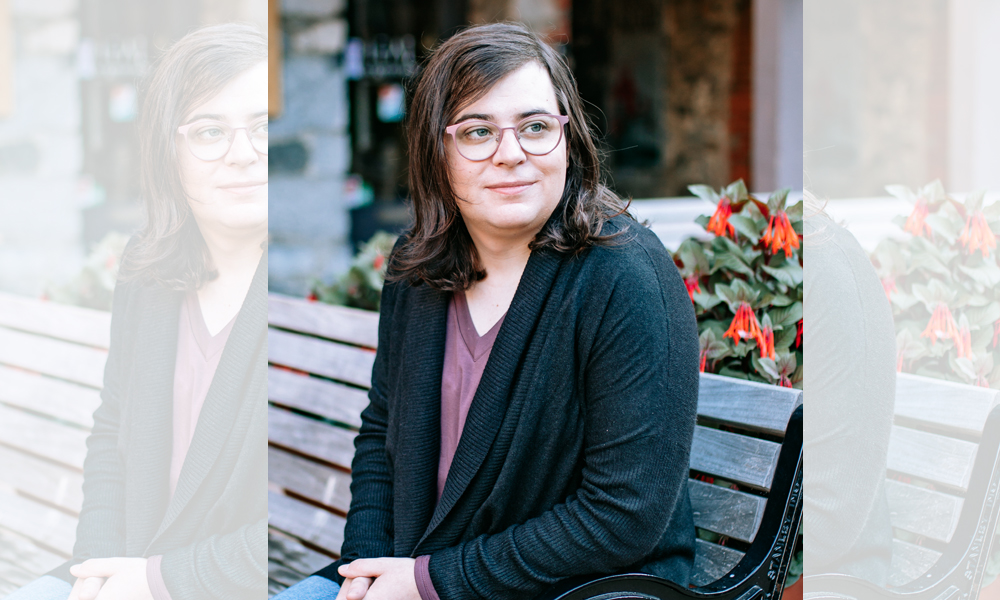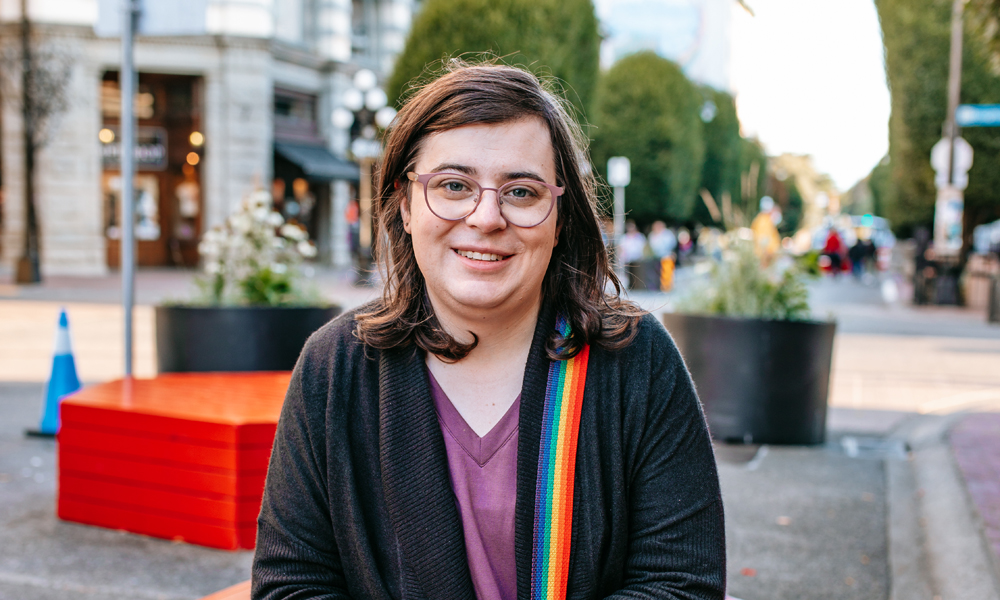Member of Parliament candidate Hannah Hodson is eager to bring new voice to the party…
By Adam Zivo
Hannah Hodson made history this year as the Conservatives’ first openly transgender electoral candidate. Hodson, who is running in Victoria, has never run for office before but is nonetheless a political veteran owing to her formidable resume as a political staffer. She spent years working with various ministers in B.C.’s Liberal government before moving to Ottawa in 2018 to work for the federal Conservative party – a jump with may seem strange to some give that the B.C. Liberals are politically centre-right and unaffiliated with their federal counterpart.
Some may ask why Hodson is running as a Conservative, a party that has historically been hostile to transgender Canadians. Hodson’s response is that the Conservatives have significantly improved on LGBTQ rights, both in terms of political culture and policy advocacy. In her own life, her Conservative friends and colleagues have been overwhelmingly supportive of her since she transitioned in early 2020, after she had spent the previous decade living as an openly bisexual man.
“I think that people have a predisposed stereotype, but it’s not my lived experience. I wouldn’t be running if I didn’t believe in the people I work with.” she says, noting that the Conservative MP she works for, as well as her colleagues, have been some of her biggest supporters.
Representation matters for Hodson, who believes that governments should resemble their citizens. It would have been important to her to see a conservative trans politician as a kid, so now she wants to be that as an adult.
Hodson disapproves of the Trudeau government’s failure to follow through on key promises to the LGBTQ community, such as criminalizing conversion therapy and tory ban on blood donations from men who have sex with men. She feels that, rather than offering genuine support, Trudeau is more interested in exploiting LGBTQ issues for political gain, and that he has deliberately stalled pro-LGBTQ legislation so that he can use them as electoral wedge issues.
Hodson believes that the Conservatives, having modernized their views on gender and sexual minorities, will be more sincere advocates for LGBTQ rights, and that they are already outperforming the Liberals in many policy areas, such as to crises affecting her community, with housing affordability and mental health being topics of particular concern for her.
“It’s impossible to have a conversation in my riding without housing coming up. The benchmark price for a home in Victoria is over one million dollars. It’s unsustainable and you can’t have a prosperous society when so many people are priced out of the market,” she says, noting that housing affordability, and high cost of living more generally, disproportionately harms LGBTQ Canadians, who have higher instances of poverty and precarious work.
Hodson argues that the Conservative platform provides the most credible solutions to Canada’s housing crisis. She appreciates the platform’s focus on drastically boosting housing supply in lieu of further overheating demand, and specifically cites densifying neighbourhoods around public transit and banning foreign investors as productive policies.
Vancouver may be ground-zero for Canada’s opioid crisis, but the problem isn’t Victoria. Hodson believes that addiction is best tackled by addressing its underlying causes, which often can be traced back to mental health issues. The Conservatives have prioritized mental health in their election platform, and Erin O’Toole has emphasized the need to treat addiction as a health, not criminal, problem.

This is something that Hodson understands on a deeply personal level, as she struggled with alcoholism in her early twenties. Heavy drinking had profound impacts on her life in college, and, by the time she was 23, she realized her alcoholism had become a debilitating impediment. “I told myself that I didn’t want to do this anymore, so I asked for help and my community was there for me,” she says. Hodson has now been sober for 11 years.
“When you say, ‘I need help,’ that’s a powerful moment in someone’s life – and help needs to be there,” she says, arguing that there hasn’t been enough focus on recovery in Canada’s mental health spaces. She isn’t opposed to harm reduction and would not shut down associated facilities, but sees it as a tool that goes hand-in-hand with recovery. Providing safe spaces to those struggling with addiction is crucial, but people need the tools to climb back out of those spaces and reclaim their dignity and autonomy.
Hodson does not want to be reduced to being just a trans candidate – even if the historicism of her candidacy has thrust that upon her. Though she is proud of her trans identity, as is evident from her bright pink blazer and pride pin, she prefers to see herself as more than just a label, and wants to be a holistic candidate who can address problems common to most of her fellow citizens.
Though there has been some pushback against her, it has been relatively minor. Those within the LGBTQ community have tended to be curious, rather than hostile, about her politics. After she explains her rationales, she finds that most people understand where she is coming from.
It helps that she avoids reading Twitter comments, which has insulated her from toxic political commentators from both the left and right – for example, Janis Zroback, Victoria’s Communist Party candidate who is also trans, tweeted that Hodson is a “neoliberal shill.”
Rather than seek out negativity, Hodson focuses on meeting Victorians in person and over the phone, bonding over mutual concerns where possible, and listening to voters about their anxieties. She credits this solution-oriented approach for her positive campaigning experiences, noting that transphobia tends to be rare because voters are more interested in discussing issues that concern their own wellbeing and the welfare of their families.
The political climate in Victoria doesn’t favour Hodson, as the Conservatives placed fourth in this riding in the last two federal elections. However, Hodson says that she’s committed to her riding because she has deep connections to the local community – this is her home, and she would rather campaign here than in any other community. Sometimes parties take several elections to build up support before winning, so, even if she doesn’t succeed this time, she may set the stage for future success, whether for herself or another Conservative candidate.
Some may find it hard to reconcile conservatism with trans issues, but Hodson makes the case that trans people ought to have a home within the Conservative party because conservatism champions liberty – which includes the freedom for individuals to live their life as is best for them, without interference from others.
Trans people are also not some distant force, but are everywhere in Canada – enmeshed in communities that they care about, working to secure a peaceful life built hard work and, where possible and desired, thriving families. Why should they be excluded from contributing to society through a conservative lens?
“We’re Canadians, too. This is who I am, and I think people should fight for their rights to live as they see fit,” Hodson concludes.
ADAM ZIVO is IN Magazine’s politics and culture columnist. He is a Toronto-based social entrepreneur, photographer and analyst best known for founding the LoveisLoveisLove campaign.






Bonnie / 11 September 2021
Zivo is a curiosity. He keeps attempting to kiss up to his ‘colleagues’ like Jonathan Kay (who is openly transphobic & harasses trans people on places like Twitter & in his columns) If anything, he’s a Conservative shill who must be blind to his party’s true record on LGBTQ people (which is horrible) and to their MPs who are downright hateful for the most part to LGBTQ people. But Zivo is so small of an individual he sacrifices any credibility he has to suck up to a party of hatred because he must hate himself. So great article on a candidate who is also willing to look away at the sins of their own party for their own gain. Great pairing of individuals. Maybe you should check Zivo’s Twitter feed next time you ask him to write for you & ask why he’s so in love with Michelle Rempel-Garner’s views & Jonathan Kay’s hatred. Hard pass on this candidate & this writer.